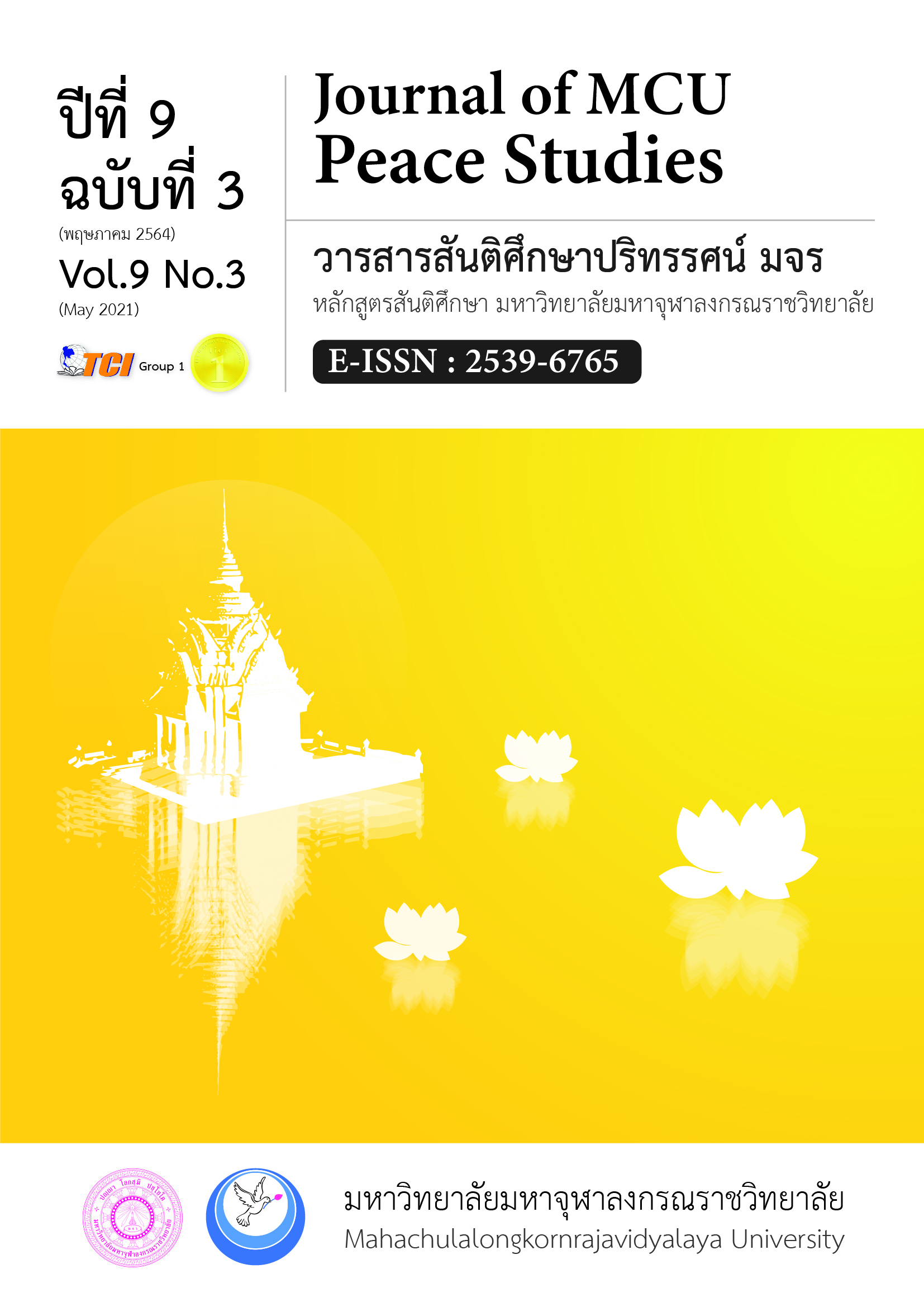Learning Online Preparedness during the COVID-19 Pandemic in Thailand
Main Article Content
บทคัดย่อ
The objective of this academic paper is to guide and inspire Human Resource Management, School Leaders and Teachers to innovate practical solutions for issues in eLearning efficiency during the current COVID-19 pandemic, drawing on failures learnt from the past. A literature review was conducted to determine the state of pre-COVID19 eLearning in Thailand with regards to ICT, teacher training, student performance and pedagogy successes and failures. The particular focus is on identification of the approaches used by management concerning training, perceived barriers, and resistance to change in the transition of Thai schools to blended learning. The findings revealed that during the pandemic there was some progress in the areas of teacher collaboration, exploratory lesson design, the use of active learning, and sensitivity to student learning styles. However, there remain significant issues regarding the delivery of teacher training, teaching methodology and needs analysis. The paper concluded with a summary of recommendations for Human Resource management, school leaders and teachers based on the competency gaps identified in the research to prepare the Thai education system for successful transition to a flexible system of blended eLearning to cope with the long-term effects of COVID-19.
Article Details
ทัศนะและความคิดเห็นที่ปรากฏในบทความในวารสาร ถือเป็นความรับผิดชอบของผู้เขียนบทความนั้น และไม่ถือเป็นทัศนะและความรับผิดชอบของกองบรรณาธิการ ยินยอมว่าบทความเป็นลิขสิทธิ์ของวารสาร
เอกสารอ้างอิง
Akarawang, C., Kidrakran, P., & Nuangchalerm, P. (2015). Enhancing ICT Competency for Teachers in the Thailand Basic Education System. International Education Studies, 8(6), 1-8.
Alqahtani, A. Y., & Rajkhan, A. A. (2020). E-learning critical success factors during the covid-19 pandemic: A comprehensive analysis of e-learning managerial perspectives. Education Sciences, 10(9), 1-16.
Amir, L. R. et al. (2020). Student perspective of classroom and distance learning during COVID-19 pandemic in the undergraduate dental study program Universitas Indonesia. BMC Medical Education, 20(1), 1-8.
Anderson, F. (2012, July 23). National identity crisis and ‘Thainess.’ Prachatai. Retrieved March 8, 2021, from http://prachatai.com/english/node/3303.
Buaraphan, K. (2015). Grades 1-12 Thai students' learning styles according to Kolb's model. Asian Social Science, 11(10), 186-201.
Changwong, K., Sukkamart, A., & Sisan, B. (2018). Critical thinking skill development: Analysis of a new learning management model for Thai high schools. Journal of International Studies, 11(2), 37-48.
Charnbhumidol, P., Kraiwanich, S., & Kraiwanit, T. (2020). Learning Method for the New Normal in Thailand. Retrieved February 27, 2021, from https://www.researchgate.net/publication/344867780_Learning_Method_for_the_New_Normal_in_Thailand.
Churngchow, C., Rorbkorb, N., Petchurai, O. T., & Tansakul, J. (2020). Appropriate Learning Management for Students with Different Learning Styles within a Multicultural Society at State-Run Universities in Thailand. International Journal of Higher Education, 9(2), 200-208.
Deerajviset, P., & Harbon, L. (2014). E-learning in EFL education in Thailand's higher education: The role for lecturers making it work. University of Sydney Papers in TESOL, 9. Retrieved February 27, 2021, from
https://faculty.edfac.usyd.edu.au/projects/usp_in_tesol/pdf/volume09/Article02.pdf
Imsa-ard, P. (2020). Thai university students’ perceptions towards the abrupt transition to ‘forced’online learning in the COVID-19 situation. Journal of Education Khon Kaen University, 43(3), 30-44.
Kaur, A., Young, D., & Kirkpatrick, R. (2016). English education policy in Thailand: Why the poor results?. In English language education policy in Asia (pp. 345-361). Springer, Cham. Retrieved February 20, 2021, from
Lamie, J. (2005). Evaluating change in English language teaching. Springer. Retrieved February 20, 2021, from https://link.springer.com/chapter/10.1057/9780230598638_2
Lim, C. P., & Wang, L. (2016). Blended learning for quality higher education: selected case studies on implementation from Asia-Pacific. Retrieved March 12, 2021, from https://unesdoc.unesco.org/ark:/48223/pf0000246851
Marinoni, G., Van’t Land, H., & Jensen, T. (2020). The impact of Covid-19 on higher education around the world. IAU Global Survey Report. Retrieved February 28, 2021, from https://www.iauaiu.net/IMG/pdf/iau_covid19_and_he_survey_report_final_may_2020.pdf
Moore, G. C., & Benbasat, I. (1991). Development of an instrument to measure the perceptions of adopting an information technology innovation. Information Systems Research, 2(3), 192-222.
Ngampornchai, A., & Adams, J. (2016). Students’ acceptance and readiness for E-learning in Northeastern Thailand. International Journal of Educational Technology in Higher Education, 13(1), 1-13.
Noom-Ura, S. (2013). English-Teaching Problems in Thailand and Thai Teachers' Professional Development Needs. English Language Teaching, 6(11), 139-147.
Ożadowicz, A. (2020). Modified Blended Learning in Engineering Higher Education during the COVID-19 Lockdown—Building Automation Courses Case Study. Education Sciences, 10(10), 1-20.
Pagram, P., & Pagram, J. (2006). Issues In E‐Learning: A Thai Case Study. The Electronic Journal of Information Systems in Developing Countries, 26(1), 1-8.
Piamsa-nga, P., & Poovarawan, Y. (2020). Design a Curriculum with User-Experience Analysis: Case Study Computing Science Curriculum. In International Conference on Blended Learning. Retrieved February 24, 2021, from https://link.springer.com/chapter/10.1007/978-3-030-51968-1_3
Puncreobutr, V. (2016). Education 4.0: New challenge of learning. St. Theresa Journal of Humanities and Social Sciences, 2(2), 92-97.
Santhuenkeaw, T., Tontiwongwanich, S., & Pimdee, P. (2019). Improving Thai student’s digital media skills: An exploratory learning model. Revista ESPACIOS, 40(15), 21-34.
Scudellari, M. (2020, August 5). How the pandemic might play out in 2021 and beyond. Retrieved March 7, 2021, from https://www.nature.com/articles/d41586-020-02278-5
Sethakul, P., & Utakrit, N. (2019). Challenges and Future Trends for Thai Education: Conceptual Framework into Action. Retrieved February 24, 2021, from https://www.learntechlib.org/p/208575/
Supalak, N. (2016). Comparative exploration of learning styles and teaching techniques between Thai and Vietnamese EFL students and instructors. Journal of Language and Cultural Education, 4(3), 103-141.
Thomas, D. (2020). Thailand University Students’ E-Learning Behavior during the Global Pandemic. Human Behavior, Development and Society, 21(4), 57-65.
Todd, R. W. (2020). Teachers’ Perceptions of the Shift from the Classroom to Online Teaching. International Journal of TESOL Studies, 2(2), 4-17.
Advisory Board. (2020). Why the coronavirus may 'never go away'. Retrieved March 6, 2021, from https://www.advisory.com/en/daily-briefing/2020/08/06/coronavirus-future


